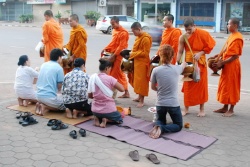Difference between revisions of "Pabbajja"
Jump to navigation
Jump to search
| (One intermediate revision by the same user not shown) | |||
| Line 1: | Line 1: | ||
[[File:211120.jpg|thumb|250px|]] | [[File:211120.jpg|thumb|250px|]] | ||
| − | [[Pabbajja]] ([[Pali]]; Skt.: [[pravrajya]]) literally means "[[to go forth]]" and refers to when a [[householder|layperson]] leaves home to [[live]] the [[life]] of a [[Buddhist]] renunciate among a [[sangha|community]] of [[monks]] ([[bhikkhu]]s). This generally involves preliminary [[ordination]] as a [[novice]] (m. ''[[samanera]]'', f. ''[[samaneri]]''). It is sometimes referred to as "lower [[ordination]]." After a period or when the [[novice]] reaches 20 years of age, the [[novice]] can be considered for the [[upasampada]] [[ordination]] (or "higher [[ordination]]") whereby the [[novice]] becomes a [[monk]] (''[[bhikkhu]]'') or [[nun]] (''[[bhikkhuni]]''). | + | [[Pabbajja]] ([[Pali]]; Skt.: [[pravrajya]]) literally means "[[to go forth]]" and refers to when a [[householder|layperson]] leaves [[home]] to [[live]] the [[life]] of a [[Buddhist]] renunciate among a [[sangha|community]] of [[monks]] ([[bhikkhu]]s). This generally involves preliminary [[ordination]] as a [[novice]] (m. ''[[samanera]]'', f. ''[[samaneri]]''). It is sometimes referred to as "lower [[ordination]]." After a period or when the [[novice]] reaches 20 years of age, the [[novice]] can be considered for the [[upasampada]] [[ordination]] (or "higher [[ordination]]") whereby the [[novice]] becomes a [[monk]] (''[[bhikkhu]]'') or [[nun]] (''[[bhikkhuni]]''). |
In some [[traditional]] [[Theravada]] countries, such as {{Wiki|Myanmar}}, boys undergo [[pabbajja]] ([[Shinbyu]]) at the age of puberty. In [[Mahayana]] countries such as [[China]] and [[Japan]], the [[pabbajja]] is preceded by a probationary period.<ref>[http://www.britannica.com/eb/article-9057892. Encyclopædia Britannica (2007a).]</ref> | In some [[traditional]] [[Theravada]] countries, such as {{Wiki|Myanmar}}, boys undergo [[pabbajja]] ([[Shinbyu]]) at the age of puberty. In [[Mahayana]] countries such as [[China]] and [[Japan]], the [[pabbajja]] is preceded by a probationary period.<ref>[http://www.britannica.com/eb/article-9057892. Encyclopædia Britannica (2007a).]</ref> | ||
| Line 7: | Line 7: | ||
{{W}} | {{W}} | ||
[[Category:Sangha]] | [[Category:Sangha]] | ||
| + | {{PaliTerminology}} | ||
Latest revision as of 06:02, 13 September 2014
Pabbajja (Pali; Skt.: pravrajya) literally means "to go forth" and refers to when a layperson leaves home to live the life of a Buddhist renunciate among a community of monks (bhikkhus). This generally involves preliminary ordination as a novice (m. samanera, f. samaneri). It is sometimes referred to as "lower ordination." After a period or when the novice reaches 20 years of age, the novice can be considered for the upasampada ordination (or "higher ordination") whereby the novice becomes a monk (bhikkhu) or nun (bhikkhuni).
In some traditional Theravada countries, such as Myanmar, boys undergo pabbajja (Shinbyu) at the age of puberty. In Mahayana countries such as China and Japan, the pabbajja is preceded by a probationary period.[1]
